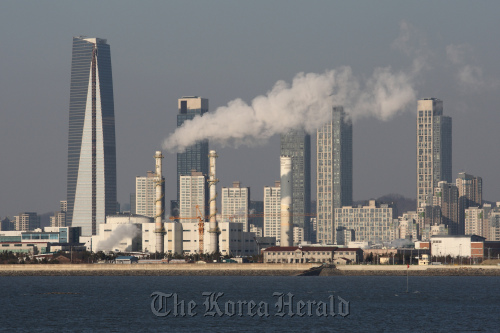LG Electronics, LS Cable, Homeplus, Amore Pacific launch Green Partnership
Korea’s leading retailers and makers of electronics, medical devices and electric wires will team up with their subcontractors to give a fresh impulsion to the government’s drive to slash greenhouse gas emissions and tackle global warming.
The Ministry of Knowledge Economy said Monday it has clinched deals with six large enterprises and their 53 suppliers and consultants for its Green Partnership program. The list includes LG Electronics, LS Cable, Homeplus, Amore Pacific, Woongjin Coway and CU Medical Co.
“The program will enable the companies to cut costs, emissions and energy consumption by shoring up collaboration in clean technology and low-carbon sustainable management,” Knowledge Economy Minister Yoon Sang-jick said at a ceremony in Seoul.
Korea’s leading retailers and makers of electronics, medical devices and electric wires will team up with their subcontractors to give a fresh impulsion to the government’s drive to slash greenhouse gas emissions and tackle global warming.
The Ministry of Knowledge Economy said Monday it has clinched deals with six large enterprises and their 53 suppliers and consultants for its Green Partnership program. The list includes LG Electronics, LS Cable, Homeplus, Amore Pacific, Woongjin Coway and CU Medical Co.
“The program will enable the companies to cut costs, emissions and energy consumption by shoring up collaboration in clean technology and low-carbon sustainable management,” Knowledge Economy Minister Yoon Sang-jick said at a ceremony in Seoul.

Launched in 2003, the project supports leading industry players and their contractors as they track their emissions and craft collective measures to trim them down.
The ministry has been funding 22 billion won ($19.6 million) over seven years to 2010 for nearly 1,000 participants to jointly develop technology, revamp the production process and install the necessary facilities.
Between June 2009 and May 2011, 166 companies together reduced more than 56,000 tons of emissions, equivalent to taking almost 113,000 cars off the roads. They also saved 27.5 billion won in energy costs during the two-year period, the ministry said.
“The initiative lays the foundations of mutual growth between industry giants and their smaller partners by encouraging them to outline joint action plans to cope with toughening global environmental regulations and climate change,” Kim Kyung-won, head of the ministry’s industrial economic policy unit, said early this year.
“Green” and “mutual” have been policy keywords under the Lee Myung-bak administration as Asia’s fourth-largest economy seeks social and environmental equilibrium in a post-industrial era.
Korea is the world’s ninth-largest polluter. Its emissions have more than doubled over the past two decades.
In 2009, Lee declared that the country will voluntarily curb its emissions by 30 percent below projected levels until 2020 and inject 2 percent of the annual gross domestic product into research and development for green technologies.
Meanwhile, criticism flared that industry heavyweights are hindering the growth of smaller vendors and competition in the market by forcing price cuts for supplies and giving lucrative orders to their own subsidiaries.
To quell the country’s aggravating income disparities, Lee has trumpeted his “fair society” mantra since last year, vowing to mend asymmetrical ties between conglomerates and small- and medium-size firms.
The Fair Trade Commission ia also cracking down on Korea’s 56 largest corporations for any irregularities in their transactions. Subject to the government’s “mutual growth index,” the firms pledged to stay committed to fair trade and profit sharing early this year.
By Shin Hyon-hee (heeshin@heraldcorp.com)
-
Articles by Korea Herald










![[Hello India] Hyundai Motor vows to boost 'clean mobility' in India](http://res.heraldm.com/phpwas/restmb_idxmake.php?idx=644&simg=/content/image/2024/04/25/20240425050672_0.jpg&u=)









